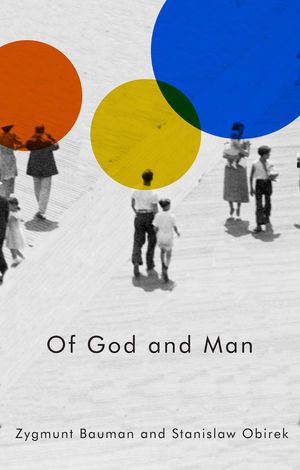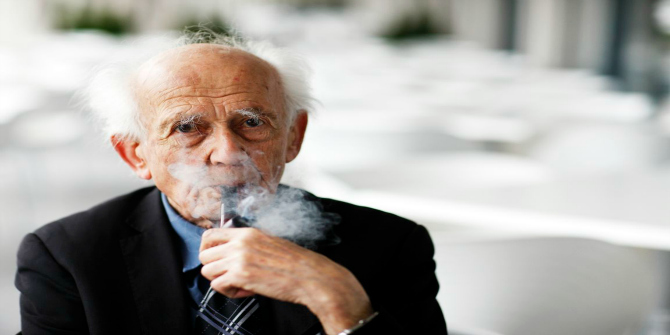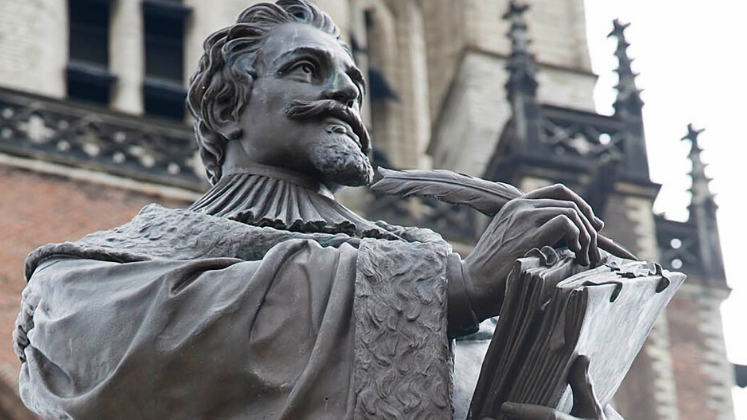In Of God and Man, sociologist Zygmunt Bauman and ex-Jesuit priest Stanislaw Obirek engage in a dialogue about the place of spirituality and religion in the everyday lives of individuals. Setting their discussion against the backdrop of twentieth- and twentieth-first-century politics and society, Bauman and Obirek explore their differences as well as their separate paths to agnosticism. Esther Adaire reflects on this restrained approach to the art of dialogue.
Of God and Man. Zygmunt Bauman and Stanislaw Obirek. Polity. 2015.
 The search for God, for many a religious devotee, is a search for truth, and Of God and Man is a dialogue largely about truth. In their restrained approach to the art of dialogue itself, sociologist Zygmunt Bauman and ex-Jesuit priest Stanislaw Obirek, now a cultural historian, navigate the boundaries of their differences in order to assess the combative ways in which people often speak of their beliefs.
The search for God, for many a religious devotee, is a search for truth, and Of God and Man is a dialogue largely about truth. In their restrained approach to the art of dialogue itself, sociologist Zygmunt Bauman and ex-Jesuit priest Stanislaw Obirek, now a cultural historian, navigate the boundaries of their differences in order to assess the combative ways in which people often speak of their beliefs.
They begin by defining the terms of one significant thing they share in common: both have, via different paths, arrived at agnosticism, which has become for them a tool of analysis in discerning how mankind comes to its conclusions about both religious and secular concerns. This agnosticism, importantly, is not ‘the antithesis of religion or even of the Church. It is the antithesis of monotheism and a closed church’ (2). Readers will quickly gather that it is also the antithesis of a closed atheism; Bauman posits that both his and Obirek’s paths to agnosticism were paths ‘from the blind arrogance of the possessor of a single truth to the restraint of a witness to multiple human truths’ (2). Based on a broad hypothesis that war and conflict often, at base, stem from a search for truth, this is a book not only about the origins of monotheism, but also the burden left by twentieth-century thought in all its totalitarian forms.
It is not, therefore, surprising that the discussion at times becomes predominantly focused on Poland. As a country steamrollered by ideology across the twentieth century, the influence of Polish history and scholarship is present throughout Bauman and Obirek’s conversation. While this may leave a number of references inaccessible to some readers, what nevertheless resonates from this influence is the continually expanding and contracting relationship between history and truth – between human experience and the doctrine it inscribes. Obirek himself conflates his own religious past with his national past, confessing that for many years he has felt burdened by both. Having overcome the temptation to be drawn to one truth alone in his religious convictions, Obirek admires political historians such as the late Maria Bobrownicka, who ‘warn[ed] Slavs against the “drug of the myth” of national Romantic illusions’, which, he astutely observes, often ‘blossom […] as myths of innocence’ (24).
Bauman, meanwhile, borrows from Maciej Zięba’s concept of a ‘verital society’ – a society in which certain beliefs become considered ultimate truths in a manner that is dogmatic – to illustrate that it is not only organised religion that ‘testifies to a war against diverse ways of life and their authorities’, but also the political creeds of Marx or Mao and ‘uncritical quasi-religious believers in physics or genetics’ (3). Bauman, himself an ex-communist who eventually was forced out of Poland due to the anti-Semitic purges of 1968, in his earlier work perceived the dialectical turn of post-Enlightenment thought towards a society in which tyranny and genocide are not aberrations from modernity, but are rather possible logical conclusions of it. Having lived through a century that has seen the devastating effects of various political Messiahs, he is well placed to caution against the violence of imposing one’s truth on others.
 Image Credit: Zygmunt Bauman (Photo: M. Oliva Soto)
Image Credit: Zygmunt Bauman (Photo: M. Oliva Soto)
The two men thus explore the possibility of a holistic or ‘polyphonic’ approach to truth with regards to morality and ethics, whether one’s conception of these stems from religious beliefs or from humanistic concerns. Early on in his and Bauman’s dialogue, Obirek draws inspiration from the appeal of local saints in Catholicism and also from contemporary Judaism, which he notes is rooted in Talmudic interpretation – that is, the tradition of rabbinical discussion surrounding the texts of the Hebrew Bible. Referencing Yochanan Muffs’s analysis of the image of God that reveals itself through a ‘laborious reading’ of the Hebrew Bible, Obirek discerns that ‘it is not only man who is created in God’s image, but also God – the creator of man – whose creation depends, for its success, upon the actions of man’ (7). Man, bestowed with both biblical law and the autonomy with which to interpret such laws, is responsible for doing God’s work on earth, based on a dialogue with God and with one’s community.
From here Obirek turns briefly to Jewish mysticism, contemplating whether the Kabbalah ‘could be a point of entry for a dialogue between religions’ (16), given its central mission of tikkun – repairing the world, or rather man’s task of assembling the shattered fragments of God’s goodness and thereby restoring harmony to his creation. Certainly, those familiar with Jewish folklore will know of a linguistic affinity between truth and violence relevant to the discussion at hand: the Golem, who is given life by the Hebrew word for ‘truth’, is destroyed once he becomes unruly by the removal of one letter so that his inscription reads ‘death’. To paraphrase Thomas Mann’s Doktor Faustus, violence is ‘the triumphant antithesis of truth’. Must one then unlearn (or learn anew) their truth, in order to avoid a negation of it?
As both Bauman and Obirek deepen their analysis of the violent manner in which man’s varying ideologies can become dogmatically inscribed, they turn to various philosophical sources on the nature of Otherness. They conclude, in reference to Gadamer, that ‘a true “engagement with the Other” cannot take place without ‘‘questioning the self’’’ (57). But Bauman remains concerned that our ‘present circumstances’ consist of ‘the cacophony of discordant voices and variety of incompatible alterities co-existing in a friction- and conflict-ridden, yet close and intimate, adjacency’ (79). Ever the shrewd critic of modernity (informed, one feels, by his intuitive understanding of it), Bauman fears that as our social lives occur more often in the virtual realms of Twitter and Facebook, we are ever more aware of our differences, while afforded the luxury of being able to simply ‘block’ or ignore that with which we disagree rather than come to a mutual understanding through reasoned dialogue. In a world of abstracted and fragmented voices, polyphony, much less harmony, is becoming increasingly impossible.
Bauman’s sober warning makes way for his concluding assertion that ‘the preliminary condition of peace, solidarity and benevolent cooperation among humans is consent to the multiplicity of ways of being human’ (112), which involves allowing ourselves to be less sure of our tightly-held convictions. Without a clear way towards achieving this ideal, in reality his and Obirek’s conversation concludes ‘without conclusions’, as they title their epilogue. Here is precisely their lesson. In circling back to agnosticism, to truth’s unknowable nature, Obirek’s closing remarks urge us not to be afraid to not know. ‘We are left with uncertainty’, he admits, but this is ‘the mother of freedom and moral decisions’ (116).
Esther Adaire is a PhD student in Modern European History at the CUNY Graduate Center in NYC. She also holds an MA in History from Goldsmiths, University of London. Her research areas include Fascist aesthetics, totalitarian personalities, gender and sexuality in Nazi Germany, and memory of the Holocaust in Germany’s Federal Republic. Read more reviews by Esther Adaire.
Note: This review gives the views of the author, and not the position of the LSE Review of Books blog, or of the London School of Economics.








3 Comments